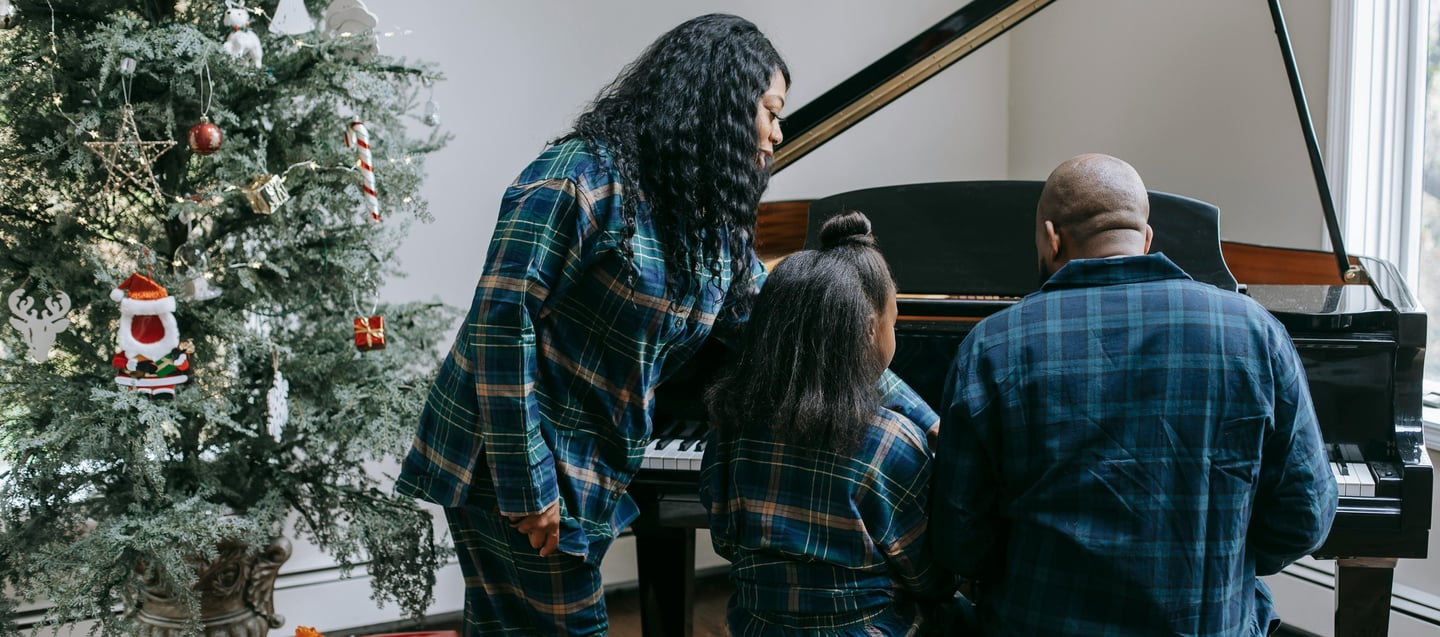The Quiet Power of Showing Up: A Parent’s Role in Music Learning
Unfold the incredible impact of your presence in your child's music journey! This blog explores how your support, encouragement, and simple acts of showing up can spark your child's growth, boost their confidence, and deepen their love for music. Learn how small steps can create big changes in their learning experience!
MUSIC EDUCATIONCHILD DEVELOPMENTPARENTAL INVOLVEMENT
The Quiet Power of Showing Up: A Parent’s Role in Music Learning
It’s 5:12 p.m. You’re stuck in traffic, your inbox is exploding, and your brain is already juggling tomorrow’s to-do list. And yet - there you are, pulling into the parking lot for your child’s piano lesson. Again. Why?
Because somewhere deep down, you know it counts. Not just the lesson. Your presence. Whether you're watching quietly from the waiting room, listening to practice while folding laundry, or simply asking, “What did you play today?” - you’re sending a clear, unspoken message: This matters. And because it matters to you, it begins to matter more to them.
Let’s look at why “just showing up” - in all its quiet, imperfect forms - can be the most powerful support you offer your child’s music journey.


Why Your Presence Matters
1. You’re the Anchor When Things Get Choppy ⚓️
Learning music is rarely a smooth ride. One day they’re excited about a new piece; the next, they’re ready to give up because their fingers “won’t cooperate.” These emotional ups and downs are completely normal. What gets them through isn’t instant success - it’s steady support.
Even when you're not in the same room - whether you’re in the kitchen or working in another room - your child still feels you being nearby. Your quiet presence serves as a calming anchor, grounding them during moments of frustration. It’s not about solving the problem for them, but about being there, reassuring them that they don’t have to face the challenge alone.
2. It’s Not About Being a Music Expert 🎼
You don’t need to read sheet music or know what a “G7 chord” is. What your child needs is your attention, not your expertise. When you show interest in their learning and progress - not just the polished results - you create a safe space to take risks, make mistakes, and grow. They learn that effort matters more than perfection, and that’s a lesson that sticks long after the music ends.
3. Music Builds Connection, Not Just Skill 🤝🏼
There’s something magical about the way music brings people together. Singing a silly tune, clapping along to a beat, or celebrating a mini home “concert” may seem small - but these are the moments that forge deep emotional bonds. They say: I see you. I hear you. I’m proud of you. And long after the song is forgotten, those messages remain.
4. Your Involvement Shapes Habits 🔁
Let’s face it - getting kids to practice consistently isn’t always easy. But routines stick when they’re reinforced with gentle, regular cues. Your presence, even if it's just five minutes of sitting nearby or reminding them it’s time to start, can turn scattered attempts into intentional effort. Over time, those nudges turn into habits. And one day, they'll surprise you by practicing on their own. That quiet little victory? You planted that.
5. You Help Connect the Dots ⧟
A teacher sees your child for a sliver of the week. You’re the one who sees the daily rhythm - and your involvement can bridge the two worlds beautifully. Jot down a quick summary of what the teacher said. Ask your child to show you their favourite part of the lesson. These little habits send a signal: Music doesn’t just live in the studio - it lives here, with us.
A parent of my intermediate piano student, Avantika recently shared, “I started writing down lesson tips in a notebook - and now Avu does it too!” That’s the power of partnership.
6. Celebrating Wins Builds Momentum 🎉
That moment your child finally plays ‘Twinkle Twinkle’ with both hands? It might not seem monumental to us - but to them, it’s everything. And if you’re there to smile, clap, or high-five in that moment? You’ve just multiplied its impact. These small, shared wins quietly build belief. “If I can do this,” they start to think, “maybe I can do other hard things too.”
7. Your Energy Shapes Theirs 🌟
Children absorb the unspoken. If music lessons feel like a chore to you, they’ll pick up on it - even if you never say a word. But if they sense your genuine interest, excitement, or even just appreciation for the process, that energy becomes theirs too. You don’t have to fake enthusiasm - just find one part that sparks joy. Maybe it’s hearing their confidence grow. Or the calm of sitting quietly during practice. That spark, no matter how small, is contagious.
8. You’re Creating Legacy Moments 📸
Ten years from now, you won’t remember every song they learned. But you will remember the living room “recitals,” the duets you child tried to teach you, the nervous excitement before their first performance. These are the stories your family will tell for years to come. And all it takes is presence - not perfection.
Simple Ways to Show Up (Even When Life is Full) 🧡
Listen to them practice - even in passing - and comment on one thing you noticed.
Ask questions like, “What made you smile in your lesson today?”
Help them set a mini goal before starting practice.
Celebrate progress with a sticker chart, a hug, or a goofy dance.
Keep a notebook of lesson tips and milestones.
Make music part of daily life: sing while cooking, play background tunes, or explore new artists together.
In Closing: You’re the Most Important Part of the Journey 🎵
Your child doesn’t need a perfect music parent. They need you - showing up, paying attention, cheering them on in the messy middle of it all. Because when you do, you’re not just helping them play piano. You’re helping them build confidence, resilience, creativity, and self-belief. So the next time you wonder if sitting through the same song for the 50th time makes a difference, remember this: It absolutely does. One day, they won’t just remember the music. They’ll remember you were there.
What’s one small way you can show up this week? Start there. 🌱
Share this on:
About The Author


Padmavathy Divakaran is a distinguished pianist, arranger, and music educator, currently serving as the Director of Aum Piano Studio. Formerly the representative for MTB Exams in Tamil Nadu and Karnataka - a globally recognised music education board based in the UK - she has consistently championed excellence in music education. Padmavathy holds a BA (Honours) in Music from Middlesex University, London, and a Diploma in Higher Education – Music from KM College of Music and Technology, Chennai. Her outstanding talent has been recognised through multiple scholarships and awards, including those presented by Dr. A.R. Rahman. As a performer, she has showcased her versatility across classical and contemporary genres, playing with orchestras in both London and Chennai. She was a core member of the Roliwood Seaboard Ensemble, playing a key role in the global launch of the ROLI Seaboard. Her artistry has earned her the honour of performing at prestigious events, including a special performance for Prince William, Simon Cowell, and other notable personalities at The Founders Forum in the UK - a testament to her global reach and artistic impact.